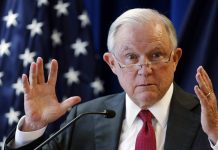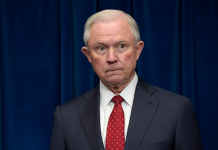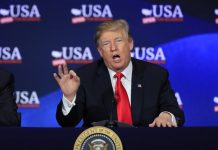WASHINGTON (AP) — Deputy Attorney General Rod Rosenstein said Tuesday he’s seen no basis for firing Robert Mueller, the former FBI director he appointed as special counsel to oversee an investigation into potential coordination between the Trump presidential campaign and Russia.
Rosenstein repeatedly conveyed his support for Mueller’s role at a Senate hearing, held the morning after a close friend of President Donald Trump was quoted in a television interview as saying he was considering dismissing Mueller.
Rosenstein testified that he is the only one who has the authority to fire Mueller, who was appointed following the May 9 ousting of James Comey as FBI director, and that he had seen no good cause to do so. He said he would agree to dismiss Mueller only if there were a legitimate basis to do so. An order from the president would not necessarily qualify, he said.
“I’m not going to follow any orders unless I believe those are proper and appropriate orders,” he said.
Rosenstein was testifying hours ahead of a separate Senate appearance by Attorney General Jeff Sessions, who was expected to face sharp questions from his former colleagues about his role in Comey’s firing, his Russian contacts during the campaign and his decision to step aside from the investigation involving Moscow and the Trump campaign.
The public testimony Tuesday before the Senate Intelligence committee should yield Sessions’ most extensive comments to date on questions that have dogged his tenure as attorney general and that led him three months ago to recuse himself from the Russia probe.
Democratic senators repeatedly criticized Sessions for dispatching Rosenstein to testify Tuesday in his place about the Justice Department’s budget to an Appropriations subcommittee. Chris Van Hollen of Maryland called it the “height of arrogance” for Sessions not to be present.
Lawmakers for weeks have demanded answers from Sessions, particularly about meetings he had last summer and fall with the Russian ambassador to the United States, Sergey Kislyak.
Those calls have escalated since fired FBI Director Comey cryptically told lawmakers last week that the bureau had expected Sessions to recuse himself weeks before he did from the investigation into contacts between Trump campaign associates and Russia during the 2016 presidential election.
Sessions, a close campaign adviser to Trump and the first senator to endorse him, stepped aside from the investigation in early March after acknowledging he had spoken twice in the months before the election with the Russian ambassador. He said at his January confirmation hearing that he had not met with Russians during the campaign.
Since then, lawmakers have raised questions about a possible third meeting at a Washington hotel, though the Justice Department has said that did not happen.
As attorney general, Sessions is unlikely to answer in detail questions about conversations he’s had with Trump. National Security Agency Director Michael Rogers and Dan Coats, the director of national intelligence, both declined to discuss their own Trump communications during a hearing last week.
White House spokesman Sean Spicer did not explicitly endorse Sessions’ appearance, saying in response to a question, “We’re aware of it, and we’ll go from there.”
Comey himself had a riveting appearance before the same Senate panel last week, with some key moments centered on Sessions.
In a February meeting, Comey said, Trump told Sessions and other administration officials to leave the room before asking him to drop a probe into former National Security Adviser Michael Flynn’s contacts with Russia.
In addition, Comey has said Sessions did not respond when he complained that he did not want to be left alone with Trump again. The Justice Department has denied that, saying Sessions stressed to Comey the need to be careful about following appropriate policies.
The former FBI director also testified that the agency had believed Sessions was “inevitably going to recuse” for reasons he could not elaborate on.
“We also were aware of facts that I can’t discuss in an open setting that would make his continued engagement in a Russia-related investigation problematic,” Comey said.
Sessions’ appearance before the intelligence committee is an indication of just how much the Russia investigation has shaded his tenure. White House frustrations with the Justice Department spilled into public view last week, when Trump on Twitter criticized the legal strategy in defending his proposed travel ban.
Spicer, the spokesman, declined to say then that Sessions enjoyed Trump’s confidence, though spokeswoman Sarah Huckabee Sanders said later in the week that the president had confidence “in all of his Cabinet.”












